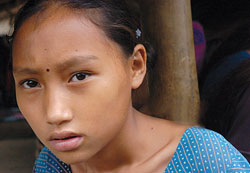|
|
In the last 14 years, Nepal tried the bilateral approach to deal with the Bhutani refugee issue, slowly moving into a confidence-building mode with Thimphu and then got entangled trying to appease Druk Yul.
GP Koirala was general secretary of his party when the refugees started arriving at the Jhapa border in 1991. As a country just emerging from a one-party rule, he said in an interview that Nepal naturally has "sympathy and support" for Bhutan's legitimate democratic struggle.
However, democratic governments in Kathmandu never had the courage to support such a movement in a landlocked absolute monarchy next door. Instead, we accepted categorisation of refugees. Nepali leaders spoke privately and officially to counterparts in Delhi for help to end the impasse, but to no avail.
With15 governments in 16 years, Kathmandu's mind was always elsewhere. Koirala is back as prime minister and we may have come a full circle on the Bhutan refugee issue. Foreign Minister KP Oli spoke to his counterpart Khandu Wangchuk in Dhaka at the SAARC Council of Minister's meeting last week and said Nepal wanted to "make a fresh beginning" to resolve the issue "once and for all".
Have we run out of options? Why isn't India keen in intervening to defuse a crisis near its strategic Chicken Neck corridor? Should we accept the third-country resettlement program advocated by the UNHCR and some donor countries?
First we must set our own priorities. Do we want the refugees to go back to Bhutan with dignity and honour or would we be content to wash our hands off the whole affair and resettle them in third countries? Are we prepared to assimilate tens of thousands of refugees in our own country while a few petitioners go west?
The alternative could be a nightmare not only for Nepal and the UNHCR but also for Bhutan and India. If more time is wasted and donors see no end in sight, they could actually withdraw support for the seven camps in eastern Nepal. That will leave 100,000 politically alert refugees little choice but to take up arms. Even UNHCR's Assistant High Commissioner for Operations Judy Cheng Hopkins says she is concerned about the possibility of growing militarisation and radicalisation of the camps. The formation of the Bhutan Communist Party (Maoist) and the recent trend of the refugees obstructing highways in Jhapa or trying to forcibly enter India at the Mechi Bridge could be indications of things to come.
Is our priority to engage South Block to lean on Thimpu at our behest? This would give us leverage against the Druk regime. Or have we already set our minds on the righteousness of the Bhutani cause and will not draw the line anywhere below their legitimate right to return to southern Bhutan? Perhaps the government could call a national conference of Bhutani refugee leaders, representatives from the US, India, Norway, Switzerland, etc, the UNHCR and the political party leaders to brainstorm.
In more than five decades, the UNHCR has helped an estimated 50 million refugees restart their lives in different countries, for which it has won the Nobel Peace Prize twice. But the announced relocation of 16 individuals under the UNHCR's special protection policy is an insult not only to the refugees but to Nepal. This can't be "an initiation to give special protection to the most vulnerable people who need special care" as UNHCR's Nepal representative advocates. Such utterances aggravate an already volatile situation and portray an unnecessarily negative image of the agency. A realistic approach could be to pressurise Bhutan to sit for bilateral talks, get genuine Bhutani nationals to go back and sort out the rest between Nepal and those countries willing to accept them.
As Bhutan enlarges its diplomatic interactions with the international community, it is in its inherent national interest to resolve this problem, which has been a blot in its image. As more and more donors including the Scandinavians get interested in settling this problem between Nepal and Bhutan, India's long-standing strategic influence over both could diminish. It is in India's national interest to pressure Thimphu to stop playing with the lives of 100,000 Bhutanis and destabilise an already sensitive region.
Settling this problem amicably is geopolitically indispensable and a humanitarian necessity.
Nischal N Pandey is the former director of the Institute of Foreign Affairs.



